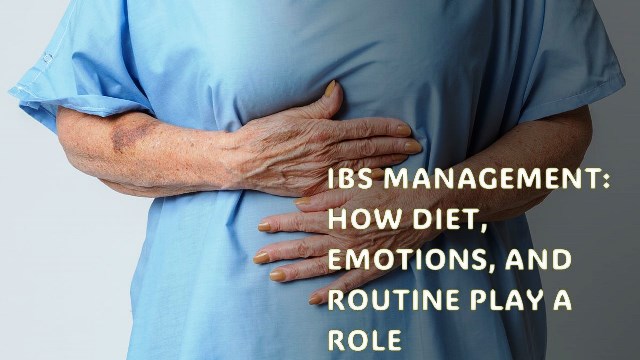Last Updated on December 31, 2024 by Dr. Abadullah Sajid Bashir
Understanding IBS (Irritable Bowel Syndrome)
Irritable Bowel Syndrome, commonly known as IBS, is a complex disorder that can significantly impact a person’s daily life. It is not life-threatening, but it brings various symptoms that can disrupt a normal, high-quality lifestyle. Here’s a closer look at what IBS involves, why it’s challenging to manage, and how individuals can adapt to live more comfortably with it.
-
What is IBS and How Does it Affect Life?
IBS is a disorder where patients experience a range of gastrointestinal symptoms that prevent them from living a typical, unrestricted life. These symptoms can include:
- Constipation or diarrhea, sometimes alternating between both.
- Abdominal cramps and pain.
- Gas and bloating, which can be uncomfortable and disruptive.
These symptoms, while not life-threatening, lower the quality of life by creating physical discomfort and emotional stress.
- The Unknown Cause of IBS: Why It’s Hard to Predict
The cause of IBS remains largely unknown, which complicates its treatment. Researchers are exploring the disorder, but there is currently no clear explanation or guaranteed cure. Some patients find that IBS can persist for decades sometimes 20 to 30 years while others may experience a shorter duration. Because the disorder varies so greatly, it’s difficult to predict how long it will affect each person.
-
Managing IBS Through Diet and Medication
Patients initially manage IBS by carefully selecting their diet and using medications to alleviate symptoms. However, as they continue to live with the condition, many begin to focus more on dietary adjustments than on medication. Adjusting to IBS often involves:
- Identifying Trigger Foods: Through trial and error, patients learn which foods lead to symptoms like bloating, cramping, or gas.
- Exploring Dietary Options: Patients might choose foods that are less likely to trigger symptoms, helping them to feel more in control.
Regular consultations with healthcare providers are also common, as patients look for advice on managing or reducing IBS symptoms.
-
The Individualized Nature of IBS: No One-Size-Fits-All Solution
Since each person’s body responds differently to foods, stress levels, and emotional states, there is no universal approach to managing IBS. For example:
- One patient with IBS-C (constipation-predominant IBS) might experience gas and stomach discomfort after eating apples, while another person with IBS might not have any adverse reaction.
- Timing can also matter; some may experience symptoms before eating, some after, and some both before and after consuming specific foods.
The unique and personal nature of IBS management means that each patient must monitor their reactions and adjust their choices to minimize symptoms.
-
The Role of Emotional State: Happiness, Stress, and IBS Symptoms
IBS symptoms aren’t solely influenced by food; emotional states play a significant role as well. Stress, heightened happiness, or even deep sadness can all trigger symptoms. Studies and anecdotal evidence suggest:
- Stress and Anxiety: People experiencing emotional strain often report an increase in IBS symptoms.
- Overwhelming Happiness: Interestingly, being exceptionally happy beyond usual levels can also lead to symptom flare-ups.
IBS patients need to understand their emotional thresholds, both in times of joy and stress, to manage their symptoms effectively.
-
Long-Term Adjustment: Developing Strategies for a Better Life with IBS
Living with IBS is a journey that involves continuous self-reflection and adjustment. Patients learn, over time, to develop strategies that help them live more comfortably. For example:
- Dietary Adjustments: Avoiding foods known to trigger symptoms or preparing meals in ways that reduce discomfort.
- Lifestyle Adaptations: Establishing routines that support mental health and reduce stress.
The key is in finding a personalized balance patients must understand how much joy, excitement, or stress they can handle without triggering symptoms.
-
Seasonal and Behavioral Variations in IBS Symptoms
IBS symptoms can fluctuate with seasons and daily routines. Behaviors that might be harmless for others can cause issues for IBS patients. For example:
- Environmental Triggers: Weather changes may affect IBS, and patients need to adapt accordingly.
- Social and Mental Balance: IBS patients might need to monitor how they socialize, manage stress, and handle emotions differently than people without IBS.
-
Creating a Supportive Environment for IBS Management
Managing IBS can be overwhelming without a structured approach. Patients benefit from developing strategies for diet, stress management, and emotional regulation. This approach can include:
- Dietary Planning: Keeping a food journal to track foods that trigger symptoms and those that do not.
- Emotional Awareness: Recognizing and setting boundaries for emotional highs and lows.
- Consultation and Support: Regularly consulting healthcare professionals and seeking support from family, friends, or IBS communities.
Without these strategies, IBS symptoms may become more difficult to handle, underscoring the importance of proactive management.
IBS is a unique disorder that requires patience, self-awareness, and strategic adjustments to manage effectively. By understanding and controlling triggers both dietary and emotional IBS patients can significantly improve their quality of life and reduce the impact of this challenging condition.
#IBS #IrritableBowelSyndrome #IBSManagement #GutHealth #DigestiveHealth #IBSDiet #IBSTips #IBSRelief #IBSLife #MindfulEating #StomachHealth #IBSAwareness #GutHealing #IBSJourney #HealthyGut #FoodSensitivity #LivingWithIBS #IBSCommunity #IBSSupport #IBSAdvice #ChronicIllness #IBSLifestyle #IBSHelp #StressManagement #LowFODMAP

